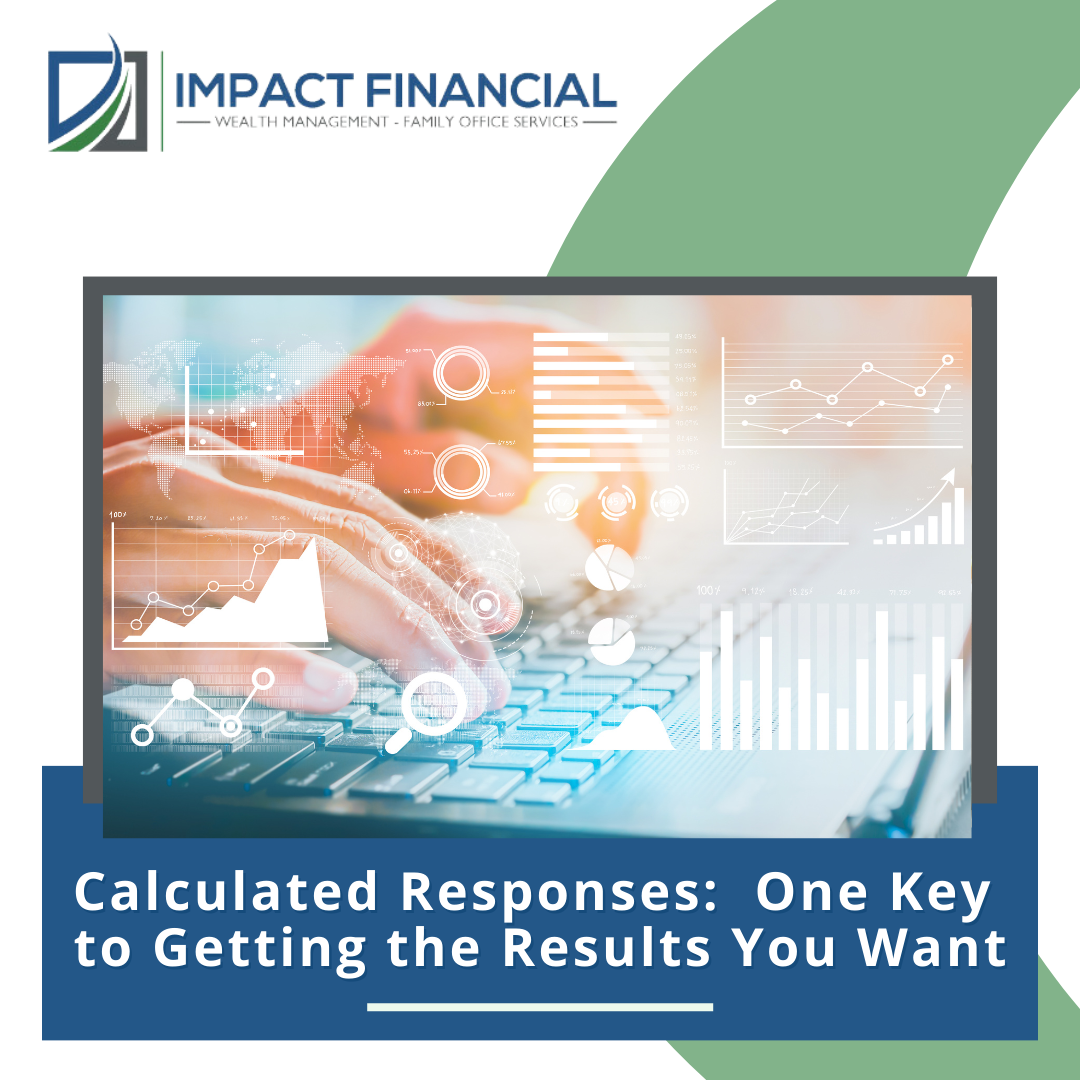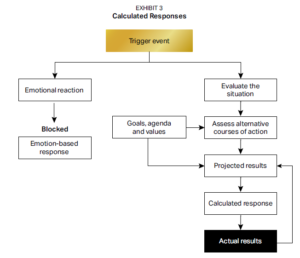Key Takeaways:
- Highly successful people tend to think through their options and the consequences of various courses of action in order to arrive at the most beneficial approach.
- Understanding the trigger event that creates the emotional reaction is a foundational step.
- Enlisting the right people for help and guidance can improve the ultimate outcome.
Regardless of how wealthy or successful you are, you share at least one thing in common with multimillionaires and billionaires: You have a set of nerve clusters located on each side of your brain’s thalamus that together make up what’s called the limbic system.
Thanks to your limbic system, situations that create tension, worry and conflict will produce emotional reactions in you. It’s natural. However, when it comes to things like reaching goals, achieving great success and generating sizable wealth, it is not the natural emotions you feel but how you train yourself to react to them that can make all the difference in your end results.
And guess what? We find that the most successful people pretty consistently react to stressful scenarios in fundamentally different ways than do the rest of us. Here’s what they do—and how you can emulate their approach as you go after your own key goals and confront your own specific challenges in business and in life.
Reactions to stressful moments
Before diving into the differences, consider your responses to a few questions:
- You’re cruising down the highway when another driver pulls into your lane without warning, cutting you off. What do you feel? How do you respond?
- You discover your child has a drug problem. What do you feel? How do you respond?
- A competitor sues you in an attempt to ruin your reputation—and your business. What do you feel? How do you respond?
- A deceitful employee sues you for sexual harassment in what you believe is an attempt to avoid fraud charges. What do you feel? How do you respond?
- A somewhat distant family member, who is in poor financial shape, asks for money. What do you feel? How do you respond?
As noted, billionaires and other highly affluent people will have emotional reactions to such situations—just like everybody else. However, instead of reacting impulsively, they are known for their calculated responses. Their feelings may influence their decisions, but their actions are very likely to be deliberate and well thought out. In professional and personal situations, they think through their options and the consequences of various courses of action in order to arrive at the most strategically, tactically beneficial approach.
Creating calculated responses
By design, calculated responses are about being in control and making sure your behavior is directed toward the outcome you desire. Based on extensive experience working with the Super Rich (those with a net worth of at least $500 million), we see they tend to follow a specific approach that helps them consistently respond in a calculated way (see Exhibit 3).
Let’s take a closer look. It all starts with a trigger event—for example, you learn that your partner is taking steps to throw you out of your company, or you discover your spouse is having an affair.
When something significant happens in your life, your aforementioned limbic system kicks in and you have an emotional reaction. You might feel fear, annoyance, anxiety, frustration, anger, happiness or some combination of these or other emotions.
The Super Rich will feel such emotions, too. What contributes to their success (business, financial or otherwise) is that they rarely act reflexively. Doing so would often put them in a bad position. In effect, they have circuit breakers that stop them from immediately responding in careless ways. Instead, they take a step back and carefully assess situations—making sure they have a deep understanding of what is occurring and why. For instance, they will look to see if there are important things happening that they are not aware of.
Armed with a solid understanding of the trigger event, the Super Rich then evaluate alternative courses of action. They consider all their viable options in terms of how well those options meet their professional and personal goals and agendas. Their values also play a big role in their responses.
In deciding on a particular calculated response, the Super Rich project out the results they expect to attain—estimating the short-term and long-term consequences.
Finally, they make their decision and implement their calculated response. Keep in mind: Calculated responses aren’t necessarily calm. They run the gamut from cool and collected to full-on temper tantrums. Even indifference can be a calculated response—if that response helps the person get the desired outcome.
Later on, by comparing the projected outcome against the actual results, the Super Rich are able to refine their thinking and approaches for the next time around. They become more adept at dealing with trigger events and delivering calculated responses. Given enough time, this process becomes deeply ingrained in their behavior—so much so that it can appear to other people to be as automatic and natural as having emotional reactions in the first place!
Action steps
There are steps you can take to emulate the Super Rich’s approach so that you can respond in a calculated, thoughtful way to events in your own life. Some key steps to consider:
1. Carefully evaluate the opportunities and consequences of each potential alternative action.
This process might be as straightforward as writing down lists of pros and cons. Some people prefer to use mind-mapping software. Mind maps are graphic-based diagrams that collect information and ideas around a central topic. Because they can incorporate pictures, drawings and color, mind maps can help some people think through ideas in more creative ways than by simply writing down text. Mind maps also emulate the way our brains process information, which can help people see better ideas and assess them faster. Another approach is using force field analysis, which is designed to determine and assess “helping forces” that will drive movement toward a goal and “hindering forces” that block or restrain that movement.
2. Focus on the minimum requirements.
When narrowing down possible calculated responses, the Super Rich focus most closely on the minimum requirements to make a response successful. In life and in decision-making, we all have our needs and our wants. If a course of action satisfies the minimum projected requirements for success—the need is met—it should be moved to the top of the list.
3. Enlist high-quality help.
Run your ideas by sounding boards and confidants. That could mean a partner or someone else you trust. It could mean an attorney who works with other people like you to address the particular situation you find yourself in. Business consultants or coaches might add value for particularly big or thorny professional or entrepreneurial challenges. Advice: Don’t just ask the “yes men” around you. Objective advice from people who are willing to give you pushback can help you arrive at much better decisions and much better outcomes.
Getting business results
When it comes to business, specifically, the self-made Super Rich generally have calculated responses to trigger events—they are adept at thinking through what is going on and the various ways it will impact them, which becomes critical to their significant and ongoing success.
Because of their calculated responses, the Super Rich are sometimes seen as unforgiving and unrelenting. They are often perceived to have a certain hardness, even viciousness, to them. Other times they’re seen as devoid of emotion and empathy entirely.
Again, like the rest of us, the Super Rich generally do feel emotions in response to trigger events. They just have the ability to supersede their emotion-driven reactions with calculated responses. Moreover, the Super Rich focus on their own goals and agendas. They do not let the positions and objectives of other people sway their decisions and actions. Think about it like this: When people create and spearhead a new disruptive technology, they do not allow the fact that people may very well lose their livelihoods if the technology fundamentally changes an industry to hold them back. On the contrary, they usually move forward as expeditiously as possible.
Be aware: It is the case, however, that calculated responses do often incorporate a certain degree of ruthlessness—of refusing to slow down even once you see how your actions might adversely affect others.
Calculated responses and your greater success
Ultimately, calculated responses are far more powerful than impulsive reactions in achieving optimal business results. The aim is to further your goals and agenda while staying within the parameters created by your values. By adopting the types of habits noted above, you can start to build in your own circuit breakers that can stop sloppy, emotion-driven actions that don’t serve you well—and replace them with carefully considered responses that lead to better results for your bottom line or your personal life—and hopefully both!
Impact Financial is here to serve you. Please reach out if you have any questions so we can provide expert advice tailored to your situation.
VFO Inner Circle Special Report
By John J. Bowen Jr.
© Copyright 2023 by AES Nation, LLC. All rights reserved.
No part of this publication may be reproduced or retransmitted in any form or by any means, including but not limited to electronic, mechanical, photocopying, recording or any information storage retrieval system, without the prior written permission of the publisher. Unauthorized copying may subject violators to criminal penalties as well as liabilities for substantial monetary damages up to $100,000 per infringement, costs and attorneys’ fees.
This publication should not be utilized as a substitute for professional advice in specific situations. If legal, medical, accounting, financial, consulting, coaching or other professional advice is required, the services of the appropriate professional should be sought. Neither the author nor the publisher may be held liable in any way for any interpretation or use of the information in this publication.
The author will make recommendations for solutions for you to explore that are not his own. Any recommendation is always based on the author’s research and experience.
The information contained herein is accurate to the best of the publisher’s and author’s knowledge; however, the publisher and author can accept no responsibility for the accuracy or completeness of such information or for loss or damage caused by any use thereof.
LPL Tracking #465454



